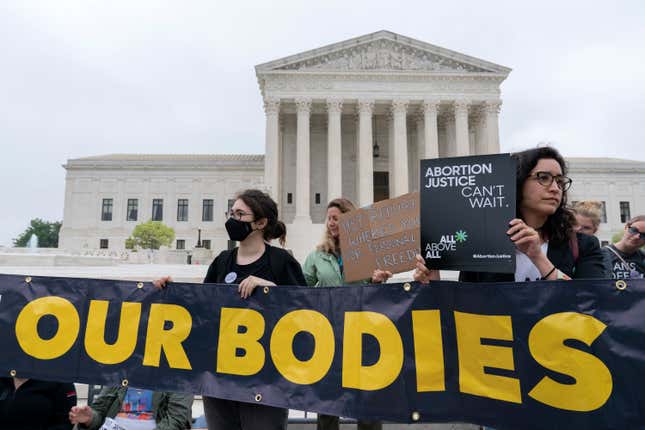
It’s not a stretch to say that the driving force behind American social and legal progress since Reconstruction has been Black people’s deeply-held fear of being dragged backward. This is for good reason; every celebration of landmark legislation (Civil Rights Act, Voting Rights Act), Supreme Court rulings (Brown v. Board of Education) or lower court verdicts (Derek Chauvin’s conviction, et al) has been muted by the Right’s zeal for regression, the Left’s political ineptitude and various forms of violent repression.
If it wasn’t for our painfully constant consciousness that the only thing standing between us and a return to second-class citizenship was an errant court ruling, this country may never have realized whatever doses of equity it has experienced since the early 20th century. Yesterday, that ruling finally arrived, bringing with it a validation of the Black fear that has undergirded generations of protest movements, civil rights lawsuits and temporary triumph.
Associate Supreme Court Justice Samuel Alito carefully worded his draft opinion that would gut abortion rights, insisting that his majority intends no harm to the millions of Americans who don’t possess a uterus (and for now, not to those who have one but live in states with at least slightly progressive legislatures). The majority doesn’t even intend to outlaw abortion, he argues, though that would be the immediate impact of the ruling in almost half of the states. They simply want to turn the right to govern what happens to women’s bodies over to the appropriate authority: state legislatures rendered intractably controlled by conservative, white males by their own gerrymandering.
If an invocation of states rights isn’t cringey enough, Alito has more, aiming a direct appeal at some Black folks with language about eugenics and a disparate number of Black fetuses not taken to term under legalized abortion.
Alito is clearly aware that some Black harbor deep distrust of the medical establishment and of abortion itself for religious reasons and that on this basis some will suspend the broader concern over the regressive nature of his draft ruling. But wherever you stand on the question of abortion, you should make no mistake about what Alito and his cohort are actually doing, which is laying out a framework by which conservative legislatures and future Courts–if not the current one–can dismantle rights far beyond abortion.
It’s all laid out in Black and white.
“Until the latter part of the 20th century, there was no support in American law for a constitutional right to obtain an abortion. Zero. None. No state constitutional provision had recognized such a right,” Alito writes on page 15, setting up this gem from page 24:
“The inescapable conclusion is that a right to abortion is not deeply rooted in the Nation’s history and traditions. On the contrary, an unbroken tradition of prohibiting abortion on pain of criminal punishment persisted from the earliest days of the common law until 1973.”
Put another way, Alito and friends would set out that the Court was not only wrong to establish a right to abortion back in 1973 but that it would be wrong to uphold almost any right not “deeply rooted” in the Constitution or in American history or traditions. In fact, they seem to argue, it has a duty to repeal any such right that may have been granted.
It shouldn’t take you long to figure out where that leads. Voting rights, which are currently under assault in Republican-controlled state legislatures, were also not deeply rooted in the Constitution for women for Black people. Nor was the right to marry a person of another race or of the same gender. Nor was your actual humanity if you’re Black.
Defenders of this decision, some of whom are certain to show up in the comments section here and in my email inbox, will argue that this logic is a short-sighted, layperson’s imagining of outcomes not intended or possible based on the draft ruling. And while I’ll acknowledge that having not gone to law school, I lack the legal scholarship of Alito and his cohort, I’ll also ask: how much of your existence are you willing to risk in the hands of the first Court to ever revoke a previously established human right?
The only acceptable answer to that question should be none.

